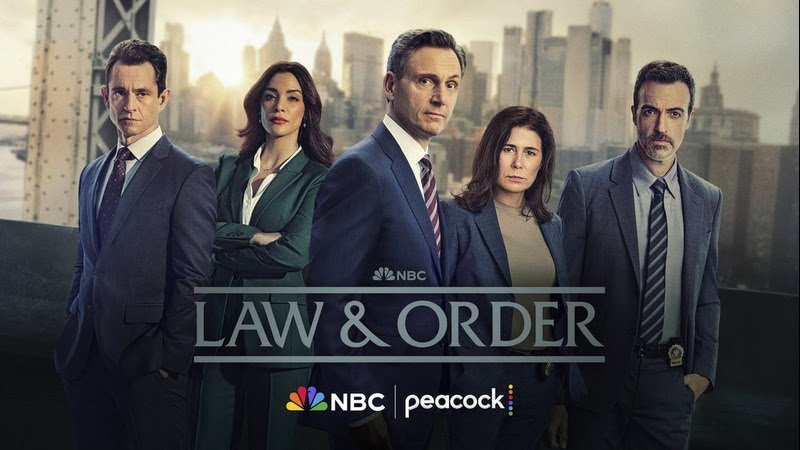Narrative Utility Over Emotional Depth
“Guardian” opens not with a bang, but a bludgeon. A 15-year-old basketball prodigy, Omari Kemp, is found dead—pipe to the skull, no robbery, no motive that makes sense. Just a boy with a gift, a heart, and a hundred-dollar bill handed to a panhandler minutes before his life was taken. The episode insists it’s about justice, but it’s about narrative utility: introducing Theo Walker (David Ajala), Detective Vincent Riley’s (Reid Scott) new partner, and revisiting the racial tropes Law & Order can’t seem to retire.
 |
| “Guardian” – LAW & ORDER, Pictured: David Ajala as Det. Theo Walker. Photo by: Virginia Sherwood/NBC @ 2025 NBCUniversal Media, LLC. All Rights Reserved |
Blood, Old Habits
Walker arrived at the 2-7 with a kind of swagger and a nose for deception; his confidence calibrated for the quick hits of Narcotics. He knew how to chase suspects and tended to trust his gut over protocol. In Narcotics, which worked. In Homicide, Riley saw it as a potential liability. His de-escalation of a bouncer and his read on a doorman show promise—but the episode leaves us wondering: is he a disruptor or just another procedural placeholder? Riley’s final line—“Do it together or find a new partner”—draws the boundary. The jury’s still out, and not just in the courtroom.
 |
|
“Guardian” |
Tropes on Trial
The case itself is a slow unraveling of institutional pressure and racial presumption. Omari, a ward of the state, had been harassed at school, his locker defaced by his adoptive brother Tyler. His coach, Jim Pickett, is boastful and bitter—claiming credit for 50 elite players and 12 NBA stars, demanding his “taste” of Omari’s future. But it’s not greed that kills—it’s fear. Pickett snaps, bludgeons the boy, and runs. His wife, complicit from the start, tries to calm nerves but ends up unraveling the alibi. Kate Pickett’s confession could have cracked the case wide open, but the judge ruled it inadmissible under marital privilege—despite Executive DA Price’s best efforts to sneak it in through legal side doors.
The courtroom scenes tread well-worn territory—recycling racial tropes with a familiarity that feels rehearsed, not reckoned with. The defense leans hard into the “scary Black man (really just a boy)” narrative, painting Omari as violent, unstable, and in need of “humanizing.” Mr. Banks, the witness, is impeached for being Black, poor, and kind—his credibility undone by proximity to the victim and a $100 bill.
Emotional Architecture Left Unbuilt
But the deeper issue is that these tropes weren’t interrogated because they’ve already been explored ad nauseam. The episode leaned on them like crutches, instead of digging into the emotional terrain that could have made the story resonate. The family dynamic—Omari’s fractured ties, Pickett’s paternal ambiguity, Mrs. Pickett’s complicity—was ripe for exploration, but every character was left one-dimensional and flat. The emotional scaffolding was there; the show just didn’t build on it.
Detective Walker, for all his promise, withholds key video evidence that could have cleared Pickett earlier. It’s a rookie mistake or a strategic gamble—either way, it complicates his debut. Riley’s warning is clear: no lone wolves. If Walker is to level up, he’ll need to earn trust, to stay in Riley’s orbit.
 |
| “Guardian” – LAW & ORDER, Pictured: Pictured: Dylan Baker as Atty. Rems. Photo by: Virginia Sherwood/NBC @ 2025 NBCUniversal Media, LLC. All Rights Reserved |
Final Verdict
“Guardian” wants to be a character study and a social critique but settles for a procedural placeholder with a new face and old habits. It gestures toward emotional depth, then backs away. It introduces a promising new detective, then undercuts him with narrative shortcuts. And it revisits racial tropes not to challenge them, but to rehearse them—again.
There’s potential here, buried beneath the pipe and privilege. But for now, Law & Order remains more interested in plot mechanics than emotional resonance. And that’s a shame. Because Omari Kemp deserved more than utility. He deserved story. What do you think of Detective Theo Walker? What do you think would have happened if he had turned over the school’s security video to the District Attorney?
Overall rating: 6/10




